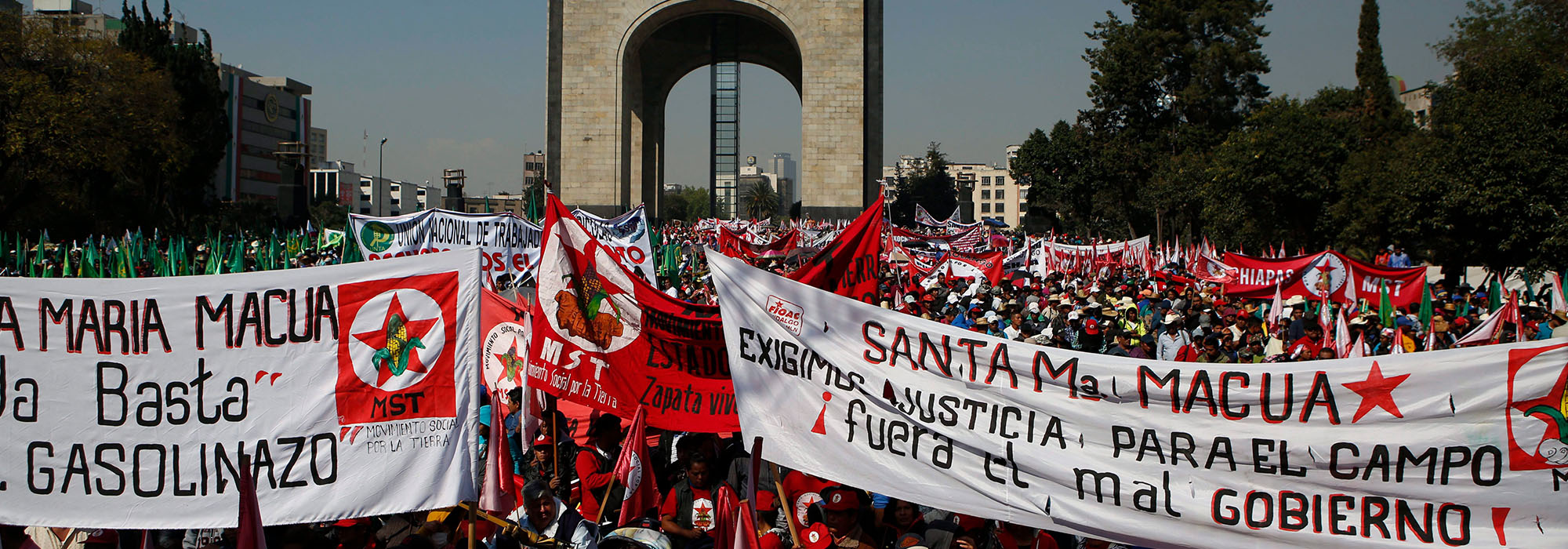
Sometimes lost in the many details and debates about trade and investment deals is the reason why we trade. The economy is meant to serve the interests of society — not the other way around. Popular movements in Europe and the United States are questioning the current economic consensus, and trade and investment deals are often lightning rods for this debate.
While some see these popular movements as nationalistic and protectionist, it would be wise to consider the possibility that they are a warning sign that the current economic consensus is flawed and failing many. In the intervening decades since NAFTA was first signed, a disproportionate share of economic growth has gone to the very, very wealthy, and labour’s share of the economic pie has shrunk. At the same time, governments in many developed nations have cut social services and begun to unwind social safety nets. The economic anxiety fuelling antitrade protests is real, and it must be addressed if we are to foster peace and prosperity globally.
Free trade models vs. free trade treaties
Economists have sometimes quipped that a true free trade deal would be only a few pages long, specifying tariff elimination schedules and not much else. Economic models and theory clearly show that removing barriers to trade in this way would increase competition and encourage more productive specialization and allocation of resources. The end result should be enhanced productivity and economic growth, and lower prices for consumers.
Unfortunately, these models don’t reflect the reality of today’s trade and investment treaties, not least because they don’t account for major power imbalances and the undue influence of large multinational corporations in treaty negotiations. Rather than getting shorter (and therefore closer to economists’ theoretical ideal), trade treaties are getting longer. NAFTA was more than 1,700 pages long and the now-defunct Trans-Pacific Partnership (TPP) was over 5,000 pages.
More often than not, treaties actually include specific protectionist measures for influential industries. Take, for instance, measures in the Comprehensive Economic Trade Agreement between Canada and the EU, which are designed to extend patent protection periods for pharmaceuticals that are estimated to cost Canadian governments and consumers a billion dollars per year.
The expansion of global value chains (GVCs), which has been supported by trade agreements, has been credited with contributing to economic growth in emerging market economies such as China, Colombia and Bangladesh. But GVCs can also exploit governance gaps that allow corporations to take advantage of weak labour and environmental laws, weak enforcement of existing laws or even corrupt legal systems in host countries. The consequences of this can be significant, as we saw with the devastating loss of life at Rana Plaza in Bangladesh, and include human rights and labour rights abuses, environmental exploitation and tax avoidance that weakens public services in both developed and emerging market nations.
NAFTA was supposed to raise wages and working conditions in Mexico, lift workers out of poverty and increase domestic demand. Instead, Mexico’s economic growth has stagnated compared to similar Latin American nations and more than half of the country falls below the poverty line. NAFTA and its labour side agreement have not observably improved wages or working conditions for workers in Mexico, as only about 1 percent of Mexican workers belong to a democratic union. Most workers are covered by “protection contracts,” which are agreements between the company and a company-approved union. If workers try to vote in a democratic union, the results are often ignored, or even worse, union organizers face harassment and threats. While corporations benefited from lower-cost labour in Mexico, these gains were not really shared with the wider population.
Economic policies beyond trade liberalization matter too
Trade and investment treaties such as NAFTA are not the only way that the current global economic model is created and recreated across the world, but they have significant symbolic value both for proponents and for those opposed. Trade liberalization is part of a package of related economic policies, often referred to as “neoliberalism,” which includes lower corporate taxes, reduced personal income tax rates for higher-income earners, deregulation and regulatory harmonization, and privatization of public services.
Critics of neoliberalism argue that these policies interact to undermine the social welfare state, making workers more vulnerable to trade and other market shocks. In this context, a “progressive model of trade,” as understood by labour groups and civil society, requires a repudiation of neoliberal economic policies, and a turn to more equitable models of political and economic governance, both domestically and internationally.
Is progressive trade possible?
The current trade model is a long way away from what workers would call “progressive trade,” as it often leaves people and the environment vulnerable to exploitation. A worker and climate-friendly trade model would establish binding linkages between human rights, labour rights, environmental standards and any benefits from trade.
Stronger labour and sustainable development chapters, with clear language and effective enforcement mechanisms, are necessary but not sufficient. This could be accomplished by combining the best qualities of Canadian and US-style labour chapters.
For example, the TPP labour chapter was built on the US model where violations are subject to the same dispute resolution mechanisms as other parts of the treaty. However the violations must be proven to have happened “in a manner affecting trade or investment between the Parties.” It turns out that this is so difficult to prove that no labour violation complaint under a United States free trade agreement has ever been successful.
The Canadian approach has leaned more on the International Labour Organization’s core labour conventions, which should also be expanded to include conventions on the rights of migrant workers, and labour inspections.
Investor-State Dispute Settlement (ISDS) mechanisms are especially unpopular, as they prioritize investor rights over investor responsibilities. Canada and Mexico have had similar dismal experiences under NAFTA — while the US has never lost a NAFTA investor-state case. ISDS chapters should be eliminated from progressive trade agreements, and any new investor protections should be subsidiary to national judicial processes and privilege state-to-state settlements.
The most effective way to compensate and transition people who lose out from economic shocks — whether from trade, automation or a variety of other sources — is to have a well-financed social safety net and universal public services. Employment Insurance and associated active labour market policies are important, but so are universal health care, child care, affordable housing and other elements of the welfare state. This is why public services must be fully carved out.
Transparency and accountability are missing from the current trade model. We need more than token stakeholder meetings or vague gender chapters to correct this gap. Environmental, human rights and gender audits can reduce exploitation and guide policy-makers toward better policy. Initial audits would be enhanced by a public system for regular monitoring and assessment of specific outcomes over time.
Finally, economic development strategies, such as strategic government procurement and community benefit agreements, must be available to domestic governments at all levels.
All of these areas represent untapped opportunities for significant improvements based on an alternative vision of a real “progressive trade agenda” — one that truly puts workers and the environment first.
This article is part of the Trade Policy for Uncertain Times special feature.
Photo: Thousands of farmers and their families carry flags and banners in front of Revolution Monument in Mexico City, Tuesday, Jan. 31, 2017. Rural residents from across the country flooded major boulevards of the capital Tuesday as they denounced a gasoline price hike that raised the price of tractor fuel, protested the governments of Mexico and the US, and called for the renegotiation of NAFTA to make it more favourable to small farmers. (AP Photo/Rebecca Blackwell)
Do you have something to say about the article you just read? Be part of the Policy Options discussion, and send in your own submission. Here is a link on how to do it. | Souhaitez-vous réagir à cet article ? Joignez-vous aux débats d’Options politiques et soumettez-nous votre texte en suivant ces directives.









